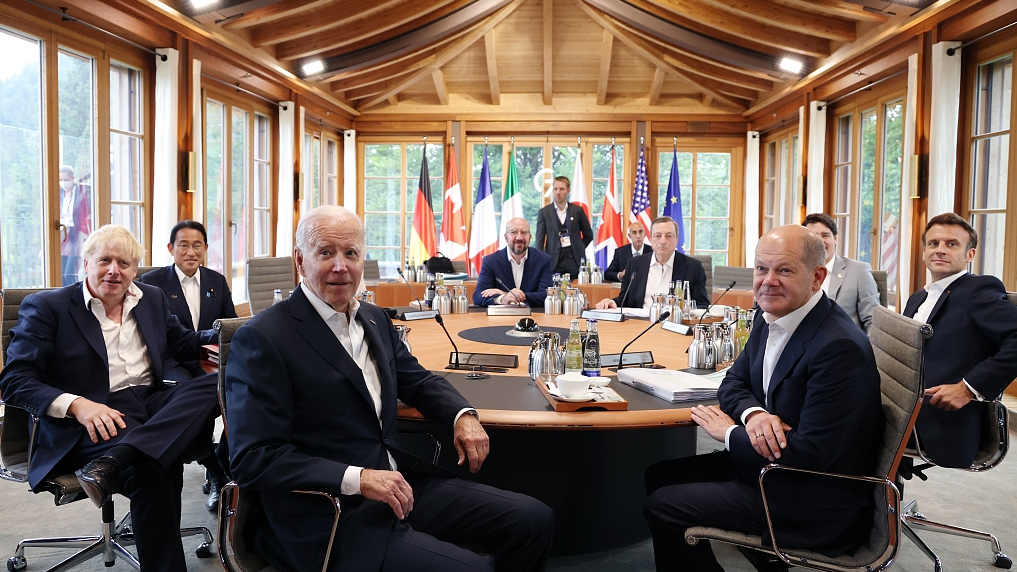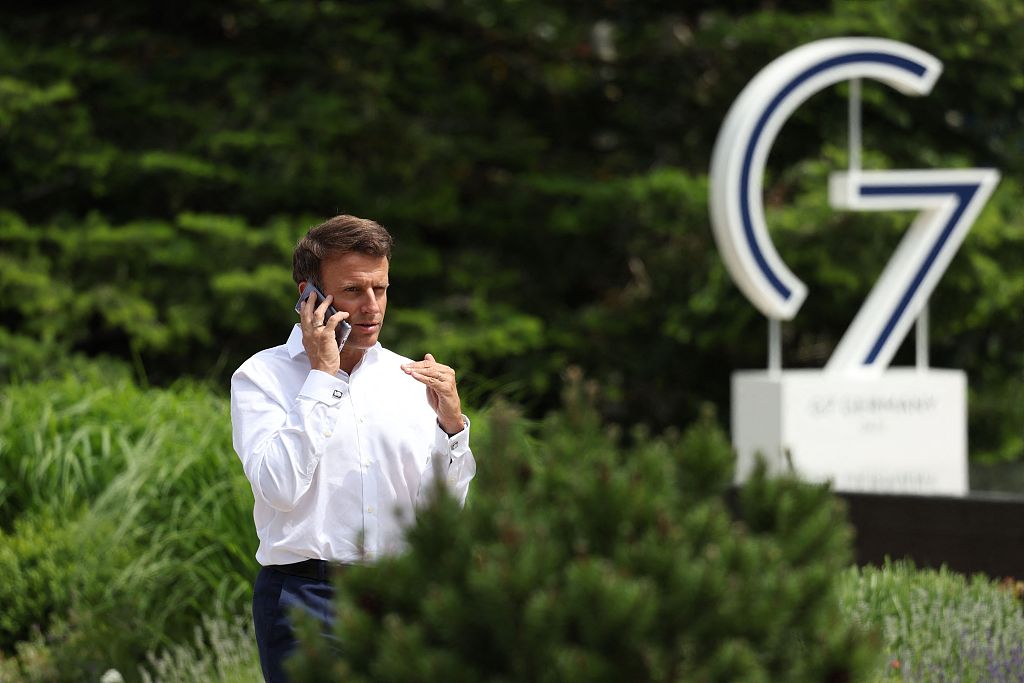
Group of Seven (G7) leaders summit at the Schloss Elmau luxury hotel in Elmau, Germany, on Tuesday, June 28, 2022. /CFP
Group of Seven (G7) leaders summit at the Schloss Elmau luxury hotel in Elmau, Germany, on Tuesday, June 28, 2022. /CFP
Editor's note: Andrew Korybko is a Moscow-based American political analyst. The article reflects the author's opinions and not necessarily those of CGTN.
Western leaders keep talking about how united they've become after Russia deployed troops to Ukraine, but the reality is different than what they portray it to be. It's true that the U.S.-led bloc has imposed unprecedented sanctions against Moscow, and the G7 just pledged to support Kyiv "for as long as it takes," but cracks are beginning to show below the surface.
Ukrainian President Volodymyr Zelenskyy said in early June that "everyone wants to push us a little towards some kind of result, definitely unfavorable to us, because they don't ask us yet, but it's beneficial for certain parties that have their own interests, both financial, and political ones." This added credence to speculation that Germany's reluctance to support Ukraine at the same level as the U.S., UK and Poland is due to its leadership's favoring a negotiated solution to the conflict.
British Prime Minister Boris Johnson warned over the weekend about Western "fatigue," even writing in an op-ed that "we should plan to sustain (constant funding and technical help to Ukraine) for years to come." London's official readout of his meeting with French President Emmanuel Macron revealed that "The Prime Minister stressed any attempt to settle the conflict now will only cause enduring instability and give Putin licence to manipulate both sovereign countries and international markets in perpetuity."
Meanwhile, a poll published by the European Council on Foreign Relations showed that more Europeans favor peace over punishing Russia. The growing disconnect between some European governments and their people over this sensitive issue could couple with the worsening economic crisis there caused by those countries' anti-Russian sanctions to lead to an explosion of populism in the bloc and even "a change of elites" according to Russian President Vladimir Putin.
The Russian leader shared his forecast during the mid-June's St. Petersburg International Economic Forum, which was followed shortly thereafter by the French left- and right-wing populist opposition collectively shattering the ruling party's parliamentary majority during the country's latest legislative elections. It also deserves mentioning that the French leader has tried to mediate between Moscow and Kyiv, but his efforts weren't successful enough thus far.
President Macron also earned his Ukrainian counterpart's wrath in early June over his call not to "humiliate" Russia during peace talks, ergo why Prime Minister Johnson probably had such an uncompromising position during their latest meeting. On the "eastern front" of the EU, Poland is angry at Germany for allegedly breaking a promise to replenish the tanks that Warsaw sent over to Kyiv, an agreement which Berlin claims was never reached between them.

France's President Emmanuel Macron speaks on the phone ahead of a working session with representatives of the G7 at Elmau Castle, southern Germany, on June 27, 2022. /CFP
France's President Emmanuel Macron speaks on the phone ahead of a working session with representatives of the G7 at Elmau Castle, southern Germany, on June 27, 2022. /CFP
Berlin has also been verbally attacked by the Ukrainian Ambassador to Germany Andriy Melnyk, who told the Washington Post earlier in June that he "doesn’t give a damn what they think" about his undiplomatic criticisms of their representatives. This demonstrates how angry Kyiv has become with Berlin for dragging its heels on its promised military aid, which they might be delaying on account of their preference for a negotiated solution.
It's clear that the UK, Poland and the Baltic states are the most gung-ho about escalating the Russia-Ukraine conflict and ruling out any peace talks with Russia while France and Germany have taken a more pragmatic stance. Additionally, Hungary, which is the outlier between these two emerging European factions in that it's strongly opposed to sanctioning Russia further, hasn't sent any military aid to Ukraine.
On June 28, CNN reported that "Advisers to President Joe Biden have begun debating internally how and whether Ukrainian President Volodymyr Zelenskyy should shift his definition of a Ukrainian 'victory' – adjusting for the possibility that his country has shrunk irreversibly." This came less than a full day after President Zelenskyy himself said that he wants the conflict to end by winter otherwise he's unsure whether his forces can mount an effective counteroffensive afterwards.
The past month has witnessed a spree of Russian victories in Donbass, which has coincided with the U.S.-led Western mainstream media changing its narrative about the conflict from one of Ukraine's "inevitable victory" to its potential defeat. These factors suggest that Western unity over Ukraine is weakening, with the decisive factor being whether the U.S. will join the French-German camp or if it'll stick with the British-Polish-Baltic one.
The next month will prove pivotal, not just due to these evolving interconnected military-political dynamics, but also because former U.S. National Security Advisor Henry Kissinger said during May's Davos Summit that "Negotiations need to begin in the next two months before it creates upheavals and tensions that will not be easily overcome." July is his deadline to begin such talks lest the situation could spiral out of control.
(If you want to contribute and have specific expertise, please contact us at opinions@cgtn.com. Follow @thouse_opinions on Twitter to discover the latest commentaries in the CGTN Opinion Section.)

